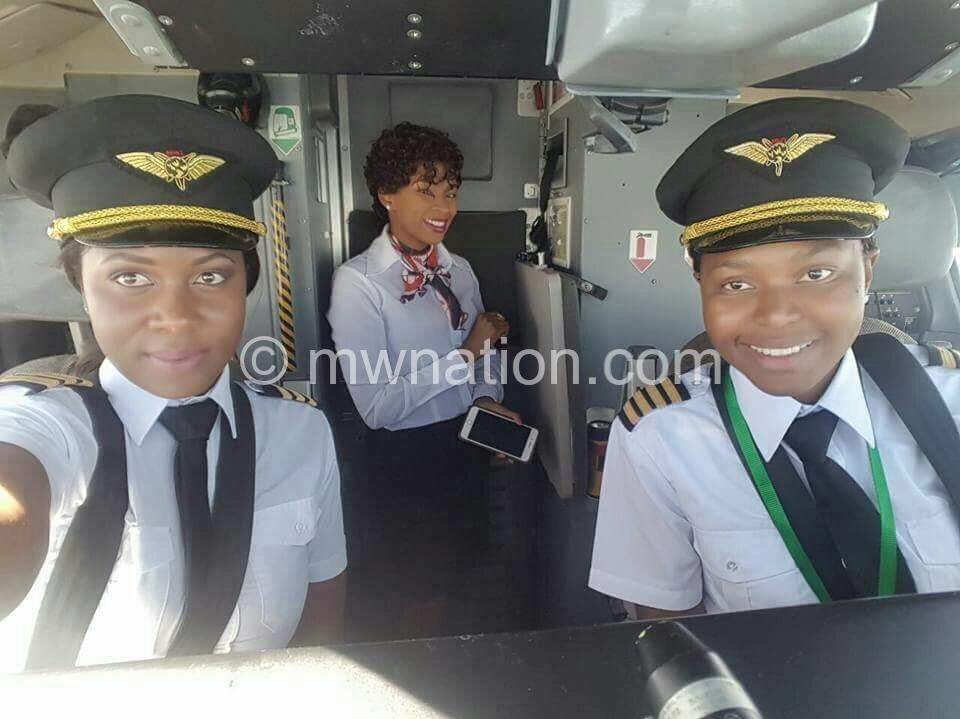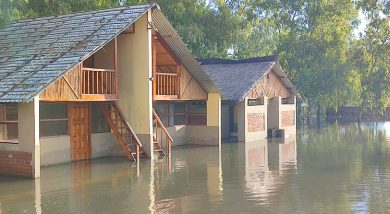Yolanda Ndala-Kaunda and Lusekelo Mwenifumbo
Malawi Shipping Company’s only active female Captain Chipiliro Mponda; Bio-statistician and lecturer at Chancellor College, Halima Twabi and also Malawian Airlines’ Captain Yolanda Ndala-Kaunda and first officer Lusekelo Mwenifumbo shared their stories with girls attending the Women in Science (WiSci) Girls Steam [Science, Technology, Engineering, Art and Design, and Mathematics] Camp on Monday. Every Woman put together some pieces from what the young women rocking the country’s aviation industry had to say.
Yolanda Ndala-Kaunda
Born and raised in Lilongwe, Malawian Airlines’ first female captain Yolanda Ndala-Kaunda always wanted to be a pilot. Her dream of becoming a pilot started as far back as six years old.
She broke the barriers in commercial aviation and now she is living her dream. even more impressively, she inspires others to achieve their own
Upon completing her high school studies at Kamuzu Academy in Kasungu, she went straight to flight school in South Africa.
“I was 19 when I went to Progress Flight Academy in South Africa. I joined Malawian Airlines (then Air Malawi) at 21, and I have been flying for nine years now. I always wanted to fly and I am so glad that my dream came true,” she says.
The young pilot recalls her days in graduate school, where she was the only girl in a school of 80 people. She adds that the intensity of the training itself was challenging.
“The way our school is structured is that they teach you theory in the morning and you fly in the afternoon, and all that is done back to back. Sometimes we needed more time to understand things but the course is sort of like a crush course and everything is fixed in a short space of time, but you need to finish everything. However, everything is possible if you put your heart to something and you work hard towards it,” says Ndala-Kaunda, a wife and a mother.
She acknowledges that it is to some extent tough working in a field where 80 percent are gentlemen.
“The resistance is there sometimes, when people look down on you simply because you are a woman. But I look at it from the angle that our training is exactly the same whether you are a man or a woman. And at the end of the day, they call us all pilots. Ultimately, it is all about performance and how you do your work that determines your success and successful flights,” says the 30 year old.
Her family had no one in aviation before her, and she stresses that it was her interest in aviation and aeroplanes that made her become a pilot.
Taking us through a typical day in her job, she says when she gets to work they are briefed about the day’s flights, where they are going, time schedules, the weather around the airports and how much fuel is needed, among other things.
She adds: “After that, we go to the aircraft where the engineers check if the plane is serviceable and all the other things concerning safety.”
Sharing on her experience, Ndala-Kaunda narrates of how shortly after becoming captain they had to fly in a really bad storm.
“We had to go round and round to reach our destination. Everyone was tense that day that people started calling for help. But we knew we had enough fuel and that it was much safer going round than going straight to our destination. That was one of the biggest challenges I have faced in my work.
She continues: “But I was sure about my decision and I had great assistance. We knew what we were doing and we were communicating. Even for a future lesson I know I don’t have to take pressure and give in to what people say I should do. The right decision is the right decision. My job is to get from one point to the next, with everyone that I am with, safe,” she says.
The landing is what excites her most about her job. “Landing is my favourite part. In all my experience as a pilot, I have never had a landing similar to one that I had before. Every landing is different and that is what excites me most,” she explains
As someone who wanted to fly since she was only six, she says she was very happy when she met her role model, Felistas Mkandawire when she was 14. “I was truly inspired even though I met her when she had already stopped flying,” she says.
Married to Rocky Kaunda, the mother of one calls on more women to join them in aviation. “My belief is always that if a man can do it we too can do it. Men have two hands, so do we; and if we work hard we can be just like them. It is quite unfortunate that culture plays a role in dividing work, as culture will tell you that as a woman you can only do certain things and not others,” says Ndala-Kaunda.
Lusekelo Mwenifumbo
With pilot wings fastened to her chest, stripes on her sleeves and a smile on her face, 25 year old Lusekelo Mwenifumbo always thought she would become a lawyer.
“I always argued with people and I thought I would become a lawyer. After secondary school at Marymount, I went to study Bio-Medicine in South Africa but I quit after two years because I didn’t enjoy it much. My father always wanted to be a pilot but he could not pursue his dream because of resources. He asked if I wanted to try it, I did and I fell in love with it,” Mwenifumbo explains.
Now Malawian Airlines first officer, Lusekelo is a girl that is very interested in mechanics. She says she even services her own car.
“I like hearing engines, so anything from motorbike engines, car engines and even those of aircrafts, I like to hear and look at them. I service my car on my own, but my mum still refuses me to service hers,” she chuckles. It is no wonder she ended up being a pilot.
As first officer, she is second in command on a flight, and she likens herself to a power bank. “I am not used all the time but I need to assist the best way I can when required,” she says.
Unlike her counterpart, Yolanda, she never dreamed of ever becoming a pilot. Describing herself as someone who is always sensitive with the environment and the people around her, she says she constantly draws inspiration from others.
“I always draw inspiration from people around me; from small children to old people, I know that there is something to learn from anyone that we meet. I have learnt that if you take away the thought of you being a woman, nobody can take away the curiosity in you,” she points out.
When asked what she likes most about her job, Mwenifumbo says: “Men usually think they can manipulate machines in ways that women cannot. But watching what the machine [aeroplane] can do in strong winds and when it’s bumpy and that we can manipulate it safely even in such times is what excites me about my job every day. It just feels amazing to be a pilot. Not everyone believes in women flying and the pressure helped me learn more,” she says.
She observes that when people undermine others, they give them room to prove themselves. She advises younger girls to take the criticism that people throw at them and watch why they say it.
“Find out what it is about you that makes this person think that you cannot make it. That will help you to identify your weakness and confront it. Then identify your strengths and how that can help you overcome your weaknesses. It’s always fun watching people that undermined you get surprised that you made it,” she counsels. n





